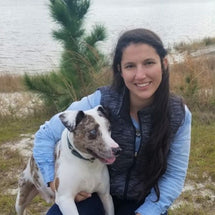A Complete Guide to Dog Dental Care

Every dog owner wants their pooch to be happy and healthy—something which can only be achieved by adopting a holistic approach to managing their overall health and wellbeing, including their dental care.
This guide will equip you with all the knowledge you need to ensure your dog dental care practices are up to scratch so you can keep their teeth clean and healthy.
Common Dental and Oral Health Problems for Dogs
Just like humans, dogs are susceptible to experiencing a range of dental and oral health issues.
Periodontal disease
Periodontal disease (also referred to as dental disease or gum disease) is the most common dental health problem among dogs, with 80% experiencing some degree of periodontal disease in their first three years of life.
Periodontal disease occurs when plaque (bacteria and food debris that sticks to the tooth surface) builds-up on your dog’s teeth over an extended period. While plaque is relatively easy to remove with regular brushing, when left ignored, plaque can develop into tartar (dental calculus) which is much harder to remove.
As tartar begins to make its way below your dog’s gum line, it allows bacteria to enter and the gums can become red and swollen (known as gingivitis). Tartar can also lead to periodontitis, where toxic substances are secreted into the gums, further damaging the gum tissue.
Not only will periodontal disease cause bad breath and bleeding gums, over time it can also affect the deep supporting structures of the teeth, depleting the bone and tissue which is holding the teeth in place.
Other Dental and Oral Health Problems
Dogs can also experience a range of other issues including:
-
Abscess: Advanced periodontal disease can create an abscess at the root of your dog’s tooth, allowing harmful bacteria to enter the space around the exposed root of the tooth which can lead to infection.
-
Oral infections: Oral infections can occur due to advanced periodontal disease or because of a cut or wound (often caused by chewing on something sharp) which has become infected.
Malocclusion: A misalignment of the top and bottom jaws which can cause pain or difficulty eating.
-
Fractured, broken or chipped teeth: Dogs are renowned for chewing, and in some cases, excessive chewing or biting on a hard object can cause the teeth to fracture, break or chip.
-
Retained baby teeth: Dogs are born with both baby and adult teeth. By six months old, most dogs’ baby teeth have been replaced by the underlying adult teeth, but in some cases, the baby tooth will remain attached to the gums causing excess plaque to accumulate.
Why Dog Dental Care is So Important?

Your dog’s dental and oral health is just as important as their general physical health. When dog dental care practices aren’t up to scratch and periodontal disease develops, it can be detrimental to the overall health and wellbeing of your dog, affecting their immune system and causing a range of other serious health issues.
Some of the health issues that dogs can experience because of poor dental and oral care include:
- the destruction of healthy tissue as part of the immune response to fight inflammatory infection
- an increased risk of experiencing heart, kidney and liver disease
- complications of diabetes
- jaw fracture, and
- physical pain and discomfort.
Prevention is always the best treatment, and a good dog dental care routine is by far the most effective preventative measure you can take to ensure your dog doesn’t experience these issues.
How to Care for Your Dog’s Teeth
While you may not be able to prevent some dental and oral health conditions, most problems can be avoided by adopting good dental hygiene practices.
Basic Dental Care for Dogs

There are a number basic dental care practices you can adopt to help keep your dog’s teeth clean and improve their dental and oral health.
-
Tooth brushing: Brushing your dog’s teeth each day is the most effective way to ensure plaque is removed before it can calcify. Regular tooth brushing not only slows the progression of oral diseases, but it can also prevent dental disease from occurring altogether.
-
Chew toys: Chew toys are another great way to keep your dog’s teeth and mouth in tip-top condition. Not only is it fun and entertaining for your dog, but the friction caused by the excessive chewing will help to clean their teeth and stimulate the production of saliva which has antibacterial properties which keep their breath fresh.
-
Dry food: Dry dog foods which your dog needs to chew to consume will help to scrub their teeth clean and keep plaque at bay. Including the occasional dental treat can also be a great way to reward your dog while supporting their dental health.
-
Dental additives: Round-out your dog’s dental and oral care routine by using an oral health water additive, tooth gel or food spray which is specially designed to keep your dog’s teeth and gums healthy and improve bad breath.
-
Regular dental check-ups: Just like we need regular dental check-ups, so do our furry friends. Your vet should do a quick check of your dog’s oral health during their annual check-up. If there are any concerns, they can arrange a complete oral examination including dental x-rays and cleaning under general anaesthesia to remove tartar and properly assess their dental condition.
How to Brush Your Dog’s Teeth

If you’ve never brushed your dog’s teeth before, it’s important to plan how you’ll introduce it into their dog dental care routine to ensure it is well-received.
While puppies are generally more willing to have their teeth cleaned, older dogs can still become accustomed to teeth brushing provided you introduce it in a positive way.
Before you start, you’ll need to purchase a dog-specific toothbrush (which is generally smaller than a regular toothbrush) from your vet or pet supply store. You could use your finger instead of a toothbrush, but it won’t work as effectively as a toothbrush.
You’ll also need to buy some dog toothpaste which is available in a range of flavours like beef, chicken, seafood, malt and peanut to make it more appealing to dogs.
When you’re ready to give it a go, try following these steps:
- Get your dog accustomed to having their mouth and teeth touched by gently touching their muzzle and running a finger along their teeth.
- Familiarise your dog with the toothbrush and toothpaste, allowing them to sniff and lick the toothbrush and have a taste of the toothpaste.
- When your dog seems relaxed with the toothbrush and toothpaste, try lifting their lips and gently rubbing the toothbrush on their front teeth in a circular motion. Repeat this over several days, finishing each session with a treat to make it a positive experience for your dog.
- Once your dog is used to the routine, gradually increase the amount of time you brush their teeth for (two minutes is ideal) and try reaching the teeth further back in their mouth.
Best Foods to Keep Your Dog’s Teeth Healthy
Some foods are more beneficial to your dog’s oral and dental health than others. Here are some dental-friendly food options you can include in your dog’s diet that will help keep their teeth clean and their breath fresh.
1. Dry dog food/kibble
Dry dog foods all do a good job keeping your dog’s teeth clean by removing plaque. If you need additional dental support, you can purchase a specialised dental dry food formula. The kibble in dental formulas typically include larger pieces that require additional chewing to scrub the teeth clean. Products which include the Veterinary Oral Health Council (VOHC) seal are known to be effective in managing dental disease.
2. Dental dog treats
Dental dog treats that require a lot of chewing are a great way to help clean your dog’s teeth and stimulate saliva production—and your dog will love it too!
Some dog treats can include artificial colours and preservatives and low-quality filler ingredients, so it’s important to choose your dental treats carefully and limit how often you provide them to your dog.
3. Other dental-friendly foods
- Raw bones: High in calcium, enzymes and probiotics, raw bones can do a great job cleaning your dog’s teeth and eliminating bad bacteria.
- Cranberries: Rich in phenolic acids and condensed tannins, cranberries have been shown to help fight cavities, reduce plaque formation and stop bacteria from sticking to surfaces.
- Strawberries: While they contain a moderate amount of sugar, the fruit acid contained in strawberries does a great job cleaning your dog’s teeth.
- Parsley: Contains antimicrobial properties which make it an excellent breath freshener.
-
Fennel: High in Vitamin C, fennel has anti-inflammatory properties, can help fight gingivitis and freshen your dog’s breath.
Signs Your Dog Might Have Dental Problems
Domesticated dogs have retained their ancestral instinct to disguise any signs of pain as it would make them vulnerable to attack in the wild. This can make it difficult to identify if your dog is suffering from a dental issue. However, as oral and dental health issues progress, your dog may start to display some symptoms such as:
- inflamed or bleeding gums
- regular pawing at their mouth
- bad breath (especially odour that returns quickly after cleaning)
- swelling or lumps in their mouth
- loss of appetite/lack of interest in food or difficulty picking up or chewing their food
- resistance to having their teeth brushed or pulling away when you touch their head
- yellow-brown discoloured teeth
- broken, loose or rotated teeth
- excessive drooling.
If you’ve noticed your dog displaying any of these symptoms, it’s worth paying a visit to your vet for a dental check-up to ensure optimal dog teeth health.

If you’re on the lookout for some tasty and wholesome dental dog treats which your pooch will be sure to love, check out the Petzyo dental dog treat range here.






